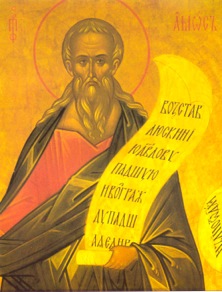Notes on Amos 1:1

The scholars often remind us that the prophets were people who spoke for God. Thus, they were primarily forth-tellers, not primarily fore-tellers. It is a point that needs to be repeated often.
For some reason, in the popular mind, prophesy has become connected with prediction. When popular preachers speak of what they call "Bible Prophesy" they are most often referring to Bible Apocalyptic: like the highly symbolic material in the book of Daniel or the book of Revelation. But, this is not the heart of prophesy.
The heart of prophesy is: "Thus says the LORD."
The real desire of the prophet was to speak the will and mind of God to their generation. Their words allowed people to look at life from another perspective: not simply from their own ideas and self-interest and goals. The people were challenged to see things from God's perspective.
In the opening words of the prophecy of Amos (the editor's brief introduction, I guess) the word "prophet isn't even used. But, the idea is there.
דִּבְרֵי עָמוֹס אֲשֶׁר־הָיָה בַנֹּקְדִים מִתְּקוֹעַ אֲשֶׁר חָזָה עַל־יִשְׂרָאֵל בִּימֵי עֻזִּיָּה מֶלֶךְ־יְהוּדָה וּבִימֵי יָרָבְעָם בֶּן־יוֹאָשׁ מֶלֶךְ יִשְׂרָאֵל שְׁנָתַיִם לִפְנֵי הָרָעַשׁ
"The words of Amos, who was among the shepherds of Tekoa, which he saw concerning Israel in the days of King Uzziah of Judah and in the days of King Jeroboam son of Joash of Israel, two years before the earthquake." (NRSV)
Amos himself actually disavows the title of "prophet" (נָבִיא)
Amos 7:14
וַיַּעַן עָמוֹס וַיֹּאמֶר אֶל־אֲמַצְיָה לֹא־נָבִיא אָנֹכִי וְלֹא בֶן־נָבִיא אָנֹכִי כִּי־בוֹקֵר אָנֹכִי וּבוֹלֵס שִׁקְמִים
"Then Amos answered Amaziah, 'I am no prophet, nor a prophet’s son; but I am a herdsman, and a dresser of sycamore trees....'" (NRSV)
He didn't make his living as a prophet, nor was he connected to a guild of prophets. He was no professional prophet — he made his living in other ways.
But, the editor of the book tells us that he spoke for God: "The words of Amos, who was among the shepherds of Tekoa, which he saw concerning Israel...."
He spoke words... which he saw. They were not simply his own words. He had a revelation and conveyed its sense to his generation.
He came without credentials. And, he claimed none.
Credentials can be a way to control. A religious institution can insulate itself from ever hearing a prophetic word, by carefully controlling who gets in. But, to speak a word to this generation, God bypassed the priests and the recognized prophets to bring the message through a "herdsman" and a "dresser of sycamore trees" who was "among the shepherds of Tekoa" and who was not part of any prophetic guild.
Are we ready to hear a word from God — even it comes from an unauthorized source?
And, there’s another thing that bothers me about Amos. He was a (southern kingdom) Judean, giving a message of judgement to the Northern Kingdom of Israel (often called Ephraim). He is an outsider, whose only credentials are a revelation from the God of Abraham, Isaac, Jacob and Moses.
It was an unwelcome word, coming from an unauthorized source, reminding them of the God of their shared history — a God they were no longer serving.
Am I ready to hear such a word?
Powered by Disqus
